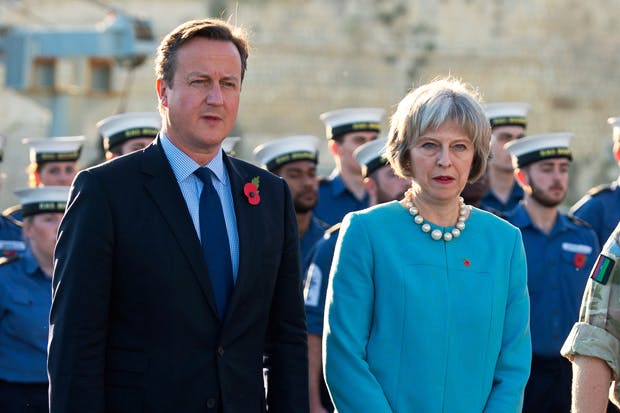In the days following David Cameron’s resignation as prime minister, Michael Gove tried to persuade the Cameroons to back Boris Johnson for the job. He argued that the former London mayor was the real continuity candidate. While Johnson would strike a very different path on Europe, Gove argued, he would keep Cameron’s domestic agenda going in a way that Theresa May would not.
This was something Gove got right. But the referendum result was far too raw for this argument to work. The rest, as they say, is history.
Since May became Prime Minister, it’s been clear that she does not represent continuity. May is her own woman. The Cameroons were taken aback by her clearout of the Downing Street policy unit, then horrified when she removed so many of them from their ministerial jobs. Cameron has privately described her reordering of the government as ‘a purge’. Now, they are angry because she is pointedly reversing many of his signature policies. In the corridors of the Palace of Westminster, the Cameroons are debating how much they should resist.
According to those close to Cameron, he did not decide to resign as an MP because of the new grammar school policy. But it can’t have helped. Cameron could have sat on the back benches as his successor kept roughly to the domestic course he had set. But trooping through the lobbies, or being conspicuous by his absence, for votes that went directly against what he had done in office would, his friends say, have been too much.
Talking to his close allies, it is clear that David and Samantha Cameron want to get on with the rest of their lives. His staying at Westminster was an obstacle to that. (There’s a lot of Notting Hill chatter about how they might move to New York.) But politically the right thing for him to have done would have been to remain as the MP for Witney. Staying on would have shown that he didn’t think politics was ‘a game’ and that he really did attach great importance to being a constituency MP.
So what are the differences between Theresa May and David Cameron that have led to this situation? As so often in Tory high politics, much of it comes down to the nuances of the class system.
Before Cameron emerged, the consensus was that the days of Old Etonian Tory leaders were long gone. When Douglas Hurd stood for the job in 1990, his education was held against him. He complained that he thought he was ‘running for leader of the Tory party, not some demented Marxist sect’. At the start of this century, Oliver Letwin thought it so obvious that an OE couldn’t be leader that he would use his schooling as a way of denying any leadership ambitions.
But Cameron’s obvious talents, and the fact that no one could claim his life had been all easy, allowed him to become the first Old Etonian Tory leader since Alec Douglas-Home. His background caused him problems throughout his tenure. It made it harder for him to talk about education and social mobility. His opposition to a selective state system stuck in the craw of grammar-school Tories precisely because of his own background.
When Cameron did touch on class-tinged subjects, he had to do so in a way that took account of how fortunate he had been. He emphasised that he wanted to ‘spread privilege’. May, with her more distinctly middle-class, grammar-school background, feels no such constraints. Instead, she talks about meritocracy: she says she wants a country where your brains and your efforts, not accident of birth, determine where you get to. She has no patrician embarrassment about the idea that it is intelligence and hard graft that should determine where you end up.
May also marks a departure from Cameron in another way. His ‘life chances’ agenda often seemed aimed at those who had virtually none: he wanted to rehabilitate prisoners, help drug addicts get clean and lift up children from the most troubled families. May, though, is unapologetic about pitching herself at those who have some opportunities, but not enough of them. She complains that education policy ‘has been skewed by the focus only on those in receipt of free school meals’. She is also explicit in detailing how upper-middle-class parents game the state-school system.
May’s interpretation of the EU referendum result, moreover, is a not-so coded criticism of her predecessor. She never misses a chance to tell us that the Brexit result wasn’t just about the EU — it was a more profound rejection of the way that Britain has been run in the past 20 years or so. That’s a denunciation of Blair and Cameron.
Cameron was never a particularly ideological politician. By and large, he was a principled pragmatist, which is why he was so adept at running a coalition. But he was attracted to ideas about the grand sweep of history — that’s one of the reasons he was so overconfident about his EU renegotiation. His government both welcomed the Arab Spring and cultivated the Chinese. One got the impression that Cameron and Osborne believed they could boost Britain’s standing by positioning us as China’s conduit to the West, in the same way Macmillan attempted to make us the Greeks to America’s Romans. May is far less interested in that kind of thing. She was sceptical about the Arab Spring and the pause over Hinkley Point C suggests she doesn’t care as much about a special relationship withBeijing.
At the moment, Brexit — the decision to hold a referendum, and the loss of it — defines David Cameron. But if May can, to use her phrase, make a success of it, people will begin to think about other aspects of his career. About how, after three successive general-election defeats, he turned the Tories back into the natural party of government. About how he made them more comfortable with modern Britain and more representative of it. In that sense, Cameron’s legacy will depend on May.
Got something to add? Join the discussion and comment below.
Get 10 issues for just $10
Subscribe to The Spectator Australia today for the next 10 magazine issues, plus full online access, for just $10.














Comments
Don't miss out
Join the conversation with other Spectator Australia readers. Subscribe to leave a comment.
SUBSCRIBEAlready a subscriber? Log in